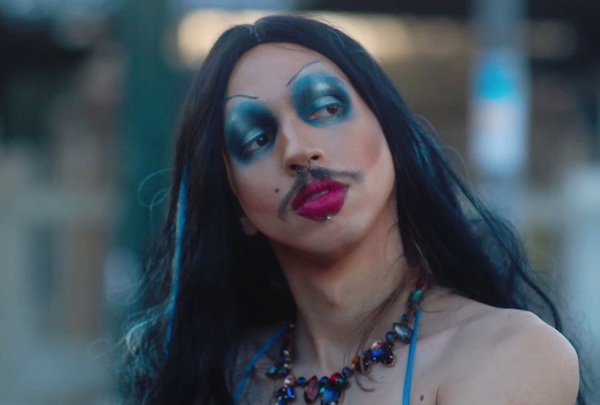Doc Talk: Wicked Queer at 40 — Embracing the Imagination
By Peter Keough
Transformative narratives shape the documentaries in the 40th annual Wicked Queer Film Festival.
Wicked Queer 40. Through April 17 at the Brattle Theatre, the Coolidge Corner Theatre, the ArtsEmerson Paramount Center, the Museum of Fine Arts, and the GSU Auditorium at Boston University. Also online April 15-30.

A scene from Jules Rosskam’s Desire Lines.
At the beginning of Jules Rosskam’s Desire Lines (2023; screens April 7 at 5 p.m. at the Coolidge Corner Theatre) one of several provocative, illuminating, and inventive documentaries at this year’s Wicked Queer Film Festival, there is a quote from Lou Sullivan, a transgender activist and writer who died of AIDS in 1991. “Our best weapon in dealing with our situation,” writes Sullivan, “is our imagination.” In other words, transgender people can exercise the power of their imagination to overcome the intransigence of biological, social, and cultural bonds. In Sullivan’s case the feat is complex and considerable — his is the first recorded case of a person transitioning from female to male in which the subject determined that he was a gay man who desired other men.
Like Sullivan taking his transitioning one extra step, Rosskam’s film also strives to stretch the limitations of the documentary film form. It combines a fictional story about a gay man seeking insights into his gender identity by delving into the resources of a dreamlike archive with interviews with real life female to male transgender subjects who extrapolate on Sullivan’s experiences. In the fictional scenario the protagonist watches an interview with Sullivan recorded close to the end of his life (chillingly he says that he is almost glad he contracted AIDS because that “proves” that he was actually a gay man). But the recordings, interviews, newspaper clippings, and other artifacts fail to bring him close enough to what he seeks.
So, guided by a young archivist, he can somehow travel in time to a kind of dream-bathhouse whose towel-clad inhabitants lurk mysteriously, often in slow motion, in the steamy rococo surroundings. It works for him perhaps. But this device, though it adds a mood of dread, mystery, and longing as it evokes Dušan Makavejev’s transgressive, portmanteau cinema essays Sweet Movie (1974) and WR: Secrets of the Organism (1971), is less compelling than the tough, funny, and candid testimony of the actual trans subjects.

A scene from Fil Ieropoulos’s Avant-Drag!.
More successful in its recasting of conventions and in its sheer exhilarating inventiveness is Fil Ieropoulos’s Avant-Drag! (screens April 6 at 4 p.m. the Brattle Theatre. Available online April 15-22). Profiling ten performers struggling to survive oppression and create art in Athens, it puts their polymorphously surreal visions of queer identity on display, their costumes and make-up evoking images ranging from nightmarish killer clowns, to John Waters’s star Divine, to the astonishing designs of Gena Marvin seen in Agniia Galdanova’s Queendom (which will screen for free on April 11 at 7 p.m. at the ArtsEmerson Paramount Center). It also shares the same kind of poetic, penetrating voiceover narration as Paul B. Preciado’s Orlando, My Political Biography (2023). “We are virus of perversity,” the narrator declares. “We are not interested in procreation. Drag infects gender. It brings it to its limits.”
No wonder some feel threatened as the artists boldly and playfully flaunt their creations in public, clad in figments of their often traumatic experiences forged into chimerical personae. Their displays delight children, but they also arouse curiosity, indifference, or hostility from others. Taking their art and identities out to the street with a rueful sense of the absurd, they delight in the works of their imagination and take pride in their accomplishments. But not without fear. As they discuss in a carnivalesque gathering at the end of the film, they live in dread of assault by transphobes and persecution by the government. Not to mention the specter of poverty, for despite the genius of their art they make almost no income from it.
As if to illustrate the dangers discussed by the subjects in Ieropoulos’s film, a trans couple were assaulted last month at the Thessaloniki Film Festival where Avant-Drag! was playing. Interviewed about the incident in Gay Times, Ieropoulos said, “Greece is a very homophobic country. It’s a very macho, traditionalist, fundamentalist, religious place where racist, homophobic, misogynist, transphobic behaviours have been tolerated for way too long. Life is still hard for most queer people here, especially trans and non-binary people and those that don’t look ‘normative’ enough to be accepted by the government’s neoliberal agenda.”

A scene from Tzeli Hadjidimitriou’s Lesvia.
Fortunately, the festival offers a film that presents an alternative to the oppression that seems to pervade Greece as seen in Ieropoulos’s film. Tzeli Hadjidimitriou has the distinction of being not only a lesbian but also a Lesbian — a native of the island of Lesbos (or Lesvos), where some 2600 years ago Sappho wrote poems in praise of women’s love for women. As Hadjidimitriou points out in her delightful, bittersweet film Lesvia (2023; screens April 7 at 6:30 p.m. at the Brattle Theatre), she had never heard of the lower case lesbians before camping out as a teenager on a beach near the village of Eressos in 1980. There, she recalls, she met “seven women, six of them perverted – as my mother would call them.” The experience transformed her life.
Her film is filled with moving personal anecdotes, richly illustrated by her movie clips and photographs. Hadjidimitriou combines these with interviews with other women from around the world who experienced similar awakenings on the island and with local residents, some of whom have yet to be awakened, in presenting an oral history of the ups and downs of the island’s international lesbian community. Is it a paradise lost? Can it be regained? When regarded in the light of nearly three millennia, anything is possible.
Peter Keough writes about film and other topics and has contributed to numerous publications. He had been the film editor of the Boston Phoenix from 1989 to its demise in 2013 and has edited three books on film, most recently For Kids of All Ages: The National Society of Film Critics on Children’s Movies (Rowman & Littlefield, 2019).
Tagged: "Avant-Drag!", "Lesvia", Desire Lines, Fil Ieropoulos, Jules Rosskam, Tzeli Hadjidimitriou, Wicked Queer 40
